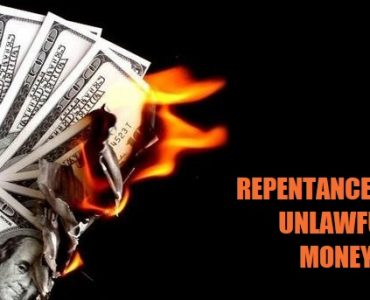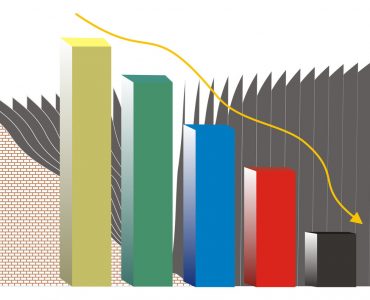The Glorified Allah commands:
“Whatever you lay out as usury, so that it may increase in the property of men, it will not increase for Allah. Whatever you give as charity, desiring Allah’s pleasure- it is those charity givers who will get manifold.” (Ar-Room/ The Romans, 30/39)
“Allah desecrated (deteriorates) usury, and causes charitable deeds to prosper. Allah does not love any ungrateful sinner. (Al-Baqara/The Cow 2/276)
As Allah is the One to imply the rules, the mentioned deterioration and prosperity point to a command and warn by informing that usury will lead to deterioration while charity will lead to prosperity.
The loan with interest –usury- is only given to those who guarantee to pay it off. As the number of the people who can guarantee this is limited, this minority takes all the credits and thus has in its hands the money of the whole society. In other words, the credit system bears serious problems from the beginning.
Let’s think about an economy where the money in the markets is 2 million units[1]. If
1 million units enter from outside the markets for a short period, a positive waving will be noticed. If the interest over this money is 10%, the money taken from the markets at the end of the agreed period is 1.100.000 units. In order to make this positive waving go on this amount is urgently needed in the markets. If this money is supplied by interest-bearing debts (usury) at the end of the term the money left in markets would be 1.790.000 units. If this happens seven times the money left in the markets would be 1.050.000 lira.
Even if this money is secured within the country with the support of a bank, the decrease of the money from 2 million to 1 million units is unavoidable as the used system would be usury. The 1 million drawn out of the markets would be in the hands of a certain number of people.
If the bank offers the money it has collected -this 1 million- as a loan with 10% interest, on the agreed payment day the money withdrawn from the markets would be 900.000 lira. The absence of 1.100.000 lira would be felt in the markets, what would lead to the need of 1.100.000 loan to keep the markets going. As it would be also given with interest the free remaining amount would be 790.000. If this process is repeated seven times the freely circulating money, the money not under the control of this bank, would be about 50.000 units. In the mean time, prices would have increased and poverty would have multiplied tremendously.
If the bank offers an interest rate of 5% to the saving owners, in 7 years’ time their money would have increased to 1,475,000, and they seem to have a profit of about 50%. In fact their losses are also big. People who make business in places where there is no credit system consider themselves to have gained if they are able to afford their expenses and secure their living. They do not pay any cost for money. However, when the credit system emerges interest becomes the cost of the money and this reflects in prices. As in our example where the interest rate of the is 10 %, the 5% interest of the savings is no benefit, because the interest rate of the loan which reflected on the prices of the goods will not only consume their profit from the interest but their capitals as well. For instance, somebody deposits 50 units in the bank with an interest rate of 5%, in a time when the kilo of sugar is 0, 5 units. After seven years he can take 73.75 units, his original capital included, but during this period the kilo of sugar becomes at least 1, 95 units. Before seven years with the amount of money he deposited in the bank, the citizen could buy 100 kilos of sugar, while now with his 73, 75 units he can purchase only about 38 kilos of sugar. Thus his money has been devaluated in a rate of about 62 %.
Agriculture, trade and industry, which form the lifeblood of society, do not deposit their money in banks, because they have to utilize it in production. However, as usury has decreased the freely circulating amount of money in a rate of 1: 20, even these sectors have serious difficulties in business.
Those who take loans with a 10% interest rate, charge at least 20% of profit on the goods and services they sell in order to afford their interest rates. If things go well the profit they obtain at the end of the year through credit is 100.000 units. As the business owners are able to afford their expenses with the opportunities this money provides, this amount is net profit. As the bank loan they will receive the following year is 1.100.000 their additional profit is 110,000 units. At the end of seven years the additional profit that they obtain is about 950,000 units. Thus this business grew up, but the market shrank. Those businesses, whose incomes are lower than the bank loan interests, are bankrupted.
The 950.000 units gained by those who relied upon bank loans, is not in cash. They use most of this money to purchase real estate. So that the market does not lose its vitality, the value of these real estates falls. As that place (where these real estates are found) loses its attraction, these people leave and move towards other locations. The Messenger of Allah has commanded:
“Even if the interest income is high, it turns into shortage at the end.”
“The time usury arises in a society; (they) are caught in/ it brings along famine. The time bribery arises in a society, it brings along fear”
Parsimony is part of human nature, of their fitra. Usury stimulates this parsimony. In order to lay it out in interest, the money should be first accumulated. The accumulation of money means its drag out of the markets. There is no command in relation to accumulation in the Koran. All commands are related to infak. The Glorified Allah commands:
“Your possessions and your children are only to try (you); the great reward is with Allah. Therefore be careful of (your duty to) Allah as much as you can. Listen, obey and make infak (spend and share) for your better. Whoever defends himself from the greediness/ parsimony of his soul gets what he hopes for. If you set apart a good portion for Allah, He will multiply it for you and forgive you; Allah does not leave the goodness without reward and He forbears (treats softly).” (Teğabun 64/15-17)
“Nafak” is a tunnel in Arabic. The first definition of the word “infak” refers to the passing through the tunnel. Every expense someone does for himself, for his family, for the people, whose maintenance he has assumed, or for hayr –charity or good intention- is called nafaka. Expenses undertaken for hayr are also loans given to Allah, because who gives his money for hayr expects its pay back only from Allah.
Money providing the flow of goods and services is the basis of economy. It must circulate like the blood in the body. The way blood transports the necessary nutrition to every cell of the body, similarly money provides people with their necessary goods and services. If money does not circulate or if its circulation is limited goods and services are wasted leading to famine and misery.
Zekat and sadaka (charity) are infak in Allah’s way. In order to revive the market, to create an environment of trust and satisfaction, and to lead all classes to beneficial works infak is obligatory. Otherwise life is dominated by dangerous developments. The Glorified Allah commands:
“Make infak (spend) in the way of Allah. Do not cast yourselves to perdition with your own hands. Do good (things). Allah loves those who do good (things).” (The Cow/ Bakara 2 / 195)
The infak undertaken in the way of Allah has a multiplying effect. The poor consumes the zekat and sadaka (charity). If it has been given in cash he spends it. For instance, he gives his debt to the grocer. Following the grocer gives it to the wholesaler, who gives it to the workers.
The worker spends it for his own need… Thus the market gains new costumers. Similarly to the blood that circulates through capillaries to every part of the body, income and wealth this way reach every part of the society. As it affords the needs of every person that takes hold of the money the market is revitalized. A unit expense sometimes can turn into 700 units, at least the needs it affords multiplying might reach these proportions when considered in monetary goods. Those who become the cause of this gain the sevap –good deed- in Allah’s way and also provide from the revival of the markets. While usury leads to shortage, the infak of the capital leads to its multiplying. The Glorified Allah commands:
“The situation of those who spend their property in the way of Allah resembles the situation of a grain growing seven ears (spikes). There are a hundred grains in every ear. Allah multiplies for whom spends. The possibilities of Allah are generous. He is all-Knowing” (The Cow/ Bakara 2 / 261)
Usury leads to the flowing of the wealth to the rich. On the other hand, zekat makes possible the flow of the wealth from the rich to the poor. This increases the purchasing potential of the people and turns them into the new costumers of the market.
[1] Units will be used as a replacement of any currency (Translator Note]







Add comment